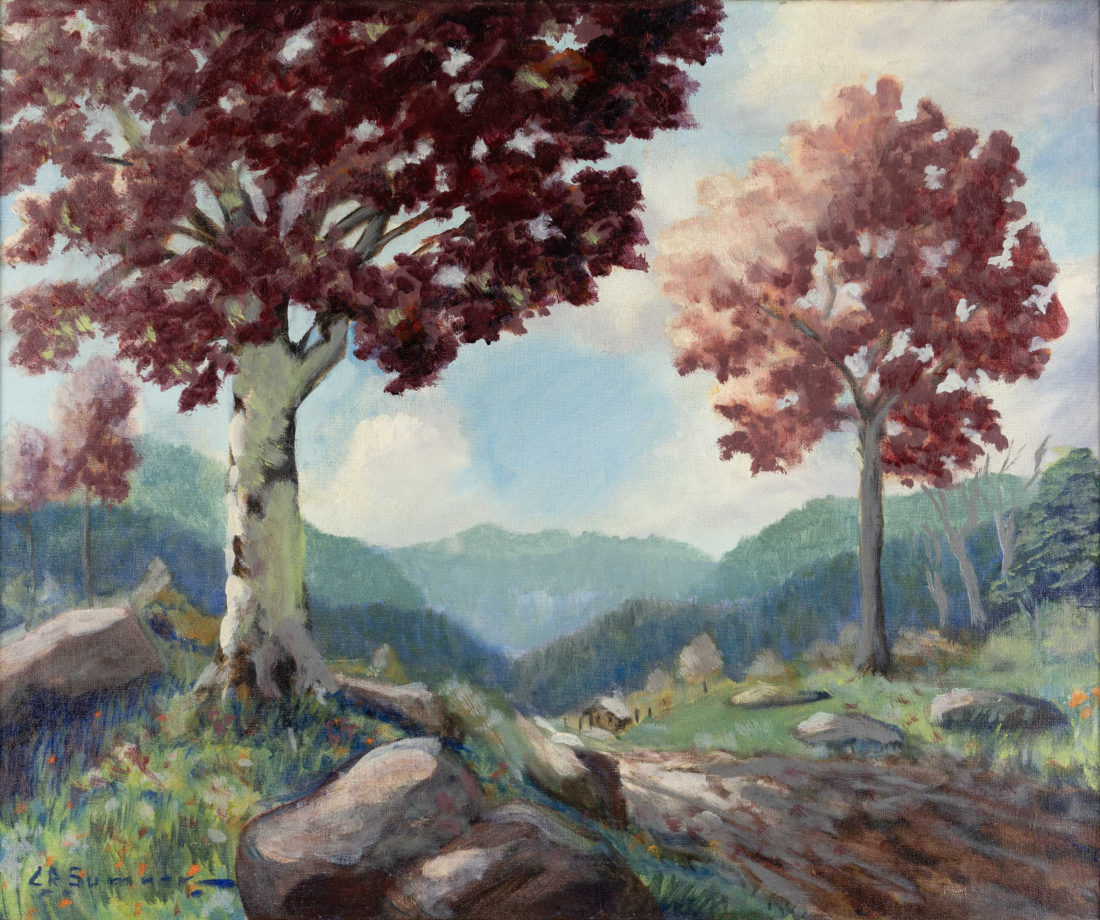The 19th-century naturalist John Muir famously wrote, “The mountains are calling, and I must go.”
As it turns out, he was not alone. Landscape artists are also among those who have answered the call.
In its latest exhibit, Honoring Nature: Early Southern Appalachian Landscape Painting, the Asheville Art Museum spotlights several early 20th-century painters who captured the soaring vistas of the Great Smoky Mountains.
“Honoring Nature is the perfect title because that’s what they were doing,” says the exhibition’s guest curator, Andrew Glasgow. “This was at a time when the rest of the art world was going toward abstract expressionism.”
But the exhibit, which runs through October, would not have been possible without loaned works from a Hickory-based couple dedicated to preserving many of the featured paintings on display.
A growing obsession
Since the 1970s, Barry Huffman and her husband, Allen, have devoted much of their free time to collecting art. Initially, the couple focused on North Carolina folk artists. Later, they pivoted to landscape painters.
“I was raised in the flatlands of North Carolina,” Barry Huffman says. “When I was in the Girl Scouts, we made a trip up to the mountains on a camping trip. I fell in love … and that’s only grown over these decades.”
Rudolph F. Ingerle, Huffman says, was one of the first landscape artists she gravitated toward. Born in Vienna, Austria, in 1879, Ingerle’s family migrated to the United States in 1891, settling in Burlington, Wis. By the 1920s, he regularly visited the Great Smoky Mountains. His obsession with the area led him to become known as the “Painter of the Smokies.”
“It just took my breath away,” Huffman says of his work, which she first saw at an exhibit at the Hickory Museum of Art. “It was just so, so wonderful. That started my interest in paintings of the North Carolina mountains. Tidbits I learned along the way just increased my curiosity.”
Huffman quickly discovered that Ingerle was not alone in his obsession. Throughout the first half of the 20th century, there was a large cohort of trained artists frequenting the region by way of Chicago and New York City to capture the area’s landscape with paint, brush and canvas. Many of these artists — including John Adams Spelman, Leo Meissner and Ruthven Byrum — are among those featured in Honoring Nature.
Also featured in the new exhibit is “Red Maple” by C.R. Sumner. Unlike many of the other artists, Sumner lived in Asheville. In addition to being a painter, he was a reporter for the Asheville Citizen. “Red Maple,” which the Huffmans donated to the Asheville Art Museum in 2018, was a foundational purchase, notes Barry Huffman, and one of the first in the couple’s expansive collection.
Fueling national pride
Steve Cotham, a Tennessee-based historian, provided written research for Honoring Nature. According to Cotham, landscape paintings were tremendously popular in the 19th century. At the time, traveling exhibitions featured room-sized paintings celebrating the American wilderness. These works drew large crowds and fueled national pride as the U.S. expanded west. They also helped win support for the fledgling conservation movement and the creation of the National Park Service in 1916.
What is special about the painters in Honoring Nature, Cotham says, “is that they were drawn to the Great Smoky Mountains when the region was new to the nation at large. They saw it and depicted it with new eyes.”
While 19th-century landscape paintings contributed to the American expansionism of Manifest Destiny, contemporary works have taken on very different meanings, according to Leisa Rundquist, professor of art history at UNC Asheville.
“Landscape is a subject that is alive and well for artists that consider it not as a scenic location but as place conceptually,” she says.
These artists, she continues, tie the practice to sovereignty, colonialism and ecology. “Indigenous artists, in particular,” she notes, “have engaged with the topic for the past 20 years or so.”
For Glasgow, the curator for Honoring Nature, landscape paintings are less political.
“I think they’re calming and beautiful,” he says. “All those things are desirable in my life at the moment, having had 2 1/2 years of treatment for cancer. That’s enough for me.”



Before you comment
The comments section is here to provide a platform for civil dialogue on the issues we face together as a local community. Xpress is committed to offering this platform for all voices, but when the tone of the discussion gets nasty or strays off topic, we believe many people choose not to participate. Xpress editors are determined to moderate comments to ensure a constructive interchange is maintained. All comments judged not to be in keeping with the spirit of civil discourse will be removed and repeat violators will be banned. See here for our terms of service. Thank you for being part of this effort to promote respectful discussion.